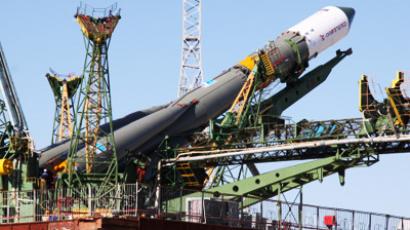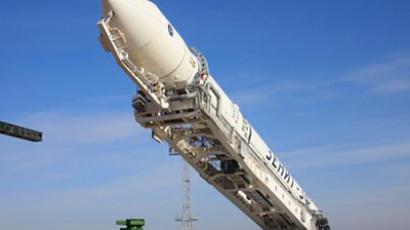Progress cargo spaceship falls in eastern Russia
The Russian cargo spaceship Progress M-12M has crashed to Earth in eastern Russia. The spacecraft’s wreckage was found in the Altai Region in southern Siberia, the ship having reportedly broken into three parts.
Aleksandr Borisov, the head of the district, told RIA Novosti that the explosion was so strong that the windows of buildings 100 kilometers from the place where the spacecraft crashed were nearly smashed. One of the witnesses said that she saw a white stripe in the sky, which she first took to be a plane. “I thought it was a plane at first, but then I realized that planes never fly that low or quietly. Then it turned into some white object and I saw that it was sparkling. It went behind the cloud and I thought that it would come out in a minute, but it disappeared. I didn’t see it again, but I heard a lot of noise. It was like three bangs, one really loud and two quieter. I thought it was thunder at first, but it was not raining at that time,” the woman explained.No casualties have been reported. However, according to the latest reports, many local cedar nut-gatherers were working in the area of the crash. “There could be people there, although I don’t know how many. People go there to collect pine nuts. They grow everywhere, so there may well be people out in the Taiga, although we don’t know how many in that area,” said Yury Shmyrin from Choisk Region administration.Space experts, however, say it is unlikely that many people could be hurt by the rocket. “There is little chance that such a rocket could land on a city, because they normally fly over very scarcely populated regions,” Mark Hempsell, vice president of the British Interplanetary Society, told RT.The local department of Emergencies Ministry has decided to cordon off the area where the satellite is thought to have hit the ground. A search operation will start on Thursday morning.
Astronauts have supplies to last up to three months
Roscosmos press service announced a special committee has been established to investigate what could have caused the incident.Specialists are now investigating what could have caused the incident, the first to happen with Russian cargo spaceships in the last 30 years. One possible cause of the crash could have been problems with the engine. “According to preliminary data, there was failure in the operation of the engine unit, which led to its emergency outage,” Roscosmos press service says.The astronauts can survive for other two or three months on the supplies they have. Another Progress cargo spaceship cannot be sent into orbit earlier than late September, reports RIA Novosti. The Progress vessel was to deliver over 2.6 tonnes of cargo to the International Space Station (ISS), including water, food, oxygen, fuel.The ISS is currently home to six astronauts from Russia, the US and Japan. The Mission Control Center near Moscow says the astronauts took the news of the Progress’s failure calmly. The spacecraft was launched from the Baikonur Cosmodrome in Kazakhstan on Wednesday. According to a source in the space industry, the accident occurred as the vehicle failed to attain its necessary orbit speed and then split from the rocket-carrier, RIA Novosti reports.Progress going down is the fourth space failure in Russia in the past twelve months. Back in December, the space program and the Russian military lost connection with three GLONASS satellites, when the satellites used for navigation plunged into the Pacific Ocean. In February, a satellite belonging to the Defense Ministry ceased functioning properly. And on August 18, the Express satellite was lost after its launch onboard a Russian Proton-M carrier rocket from Baikonur. The satellite had been sent into orbit in a bid to broaden telecommunications for Russia and the CIS countries.
Space expert Yury Karash told RT there is no reason to worry about the cosmonauts, as there is enough food and water onboard to satisfy their needs for the nex three or four months. "Things like this happen. Actually, the Soyuz launch vehicle has a very good reliability rate – almost 98 per cent,” space expert Yury Karash told RT. “ISS operation planners always keep in mind the possibility of a cargo spaceship not docking with the ISS for some reason. So the crew onboard has enough food and water supplies to survive another three or four months until another cargo spacecraft arrives at the station.”
Gerry Webb, the director of Commercial Space Technologies Ltd, is absolutely confident that the Roscosmos investigation will be quick and thorough. Webb says it is too early to make any suggestions as to what caused the accident.“Soyuz is one of the longest-running Russian rockets and has the highest reliability record equal to a shuttle or other manned aircraft,” Webb told RT. But as all expendable vehicles have a limit to their reliability, the Progress cargo ship accident comes as no surprise to Webb.
If the Progress cargo ship had been manned, it might have made a safe landing, believes Dr. Patrick Fullick of Capital Science Connections Innovation Agency. “What you could do under these sorts of circumstances is to be able to bring the car back in a controlled way using the parachute to descend to a reasonable velocity. The issue here, I think, is whether the Progress module detached from the third stage or not. Because if that happened, then saving it even with a crew onboard would have been almost impossible,” said Fullick.














